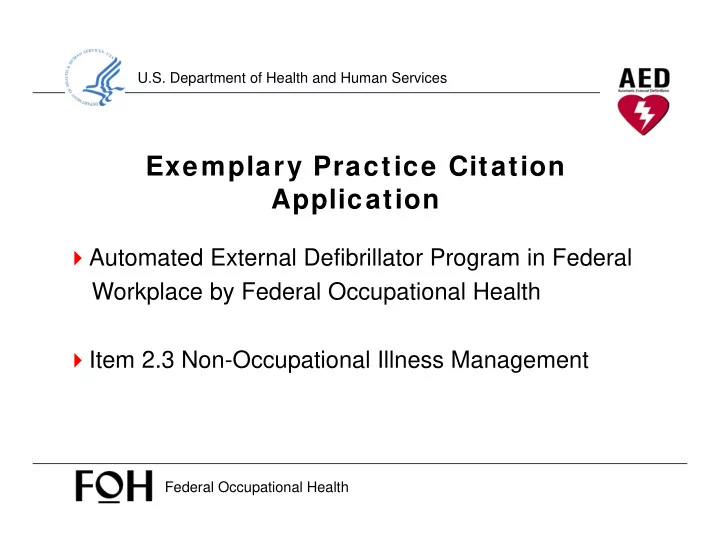

U.S. Department of Health and Human Services Exemplary Practice Citation Exemplary Practice Citation Application Automated External Defibrillator Program in Federal Workplace by Federal Occupational Health Item 2.3 Non-Occupational Illness Management Federal Occupational Health
Division of Clinical Services FEDERAL OCCUPATIONAL HEALTH: Part of the U.S. Department of Health and Human Services and a component of the U. S. Public Health Service Became fully reimbursable in 1984, operating with no Congressional appropriations i ti Federal Occupational Health
Division of Clinical Services FOH’s Mission To improve the To improve the health, safety, and productivity of the productivity of the federal workforce. Federal Occupational Health
Division of Clinical Services FOH Automated External FOH Automated External Defibrillator (AED) Programs in Workplace Programs in Workplace Commander John J. Perkner, DO, MSPH (USPHS) jperkner@psc.gov jp @p g Federal Occupational Health
Division of Clinical Services AED PROGRAM HISTORY AED PROGRAM- HISTORY Sudden Cardiac Arrest – responsible for 300 000 d 300,000 deaths per year (workplace deaths th ( k l d th prevalence unclear) American Heart Association - supports AEDs as integral part of response to Sudden Cardiac f S C Arrest in late 90’s ACOEM Position Statement on workplace p AEDs -2001 Federal Occupational Health
Division of Clinical Services FOH AED PROGRAM Need for Workplace AED Program assessed by p g y FOH 1999; pilot program started 1999-2000 FOH program has grown to over 4000 AEDs in workplaces in over 100 sites k l i 100 i Federal Occupational Health
Division of Clinical Services Federal Support for AED Programs Clinton Radio Address - May 2000 Cardiac Arrest Survival Act - November 2000 Cardiac Arrest Survival Act November 2000 DHHS Guidelines for Placement of AEDs in Federal Buildings - May 2001 g y OSHA Technical Bulletin FAA - Placement of AEDs in planes FAA - Placement of AEDs in planes Rural AED Grants Federal Occupational Health
Division of Clinical Services Federal Occupational Health
Division of Clinical Services The Odds Annual Deaths from Annual Deaths from Cardiovascular Disease – U.S. Sudden 350,000 350 000 590,000 590 000 All Other All Other Cardiac Arrest Cardiovascular Total Deaths 940 000 940,000 Federal Occupational Health
Division of Clinical Services SCA: Heart in Chaos Ventricular Fibrillation Abnormal; irregular, very fast heart rhythm Heart can’t pump blood effectively Victim: Unconscious Unconscious Not breathing spontaneously No pulse No pulse Only definitive treatment: Defibrillation Federal Occupational Health
Division of Clinical Services “Chain of Survival” R Rapid, Coordinated Response id C di t d R Improves Outcome Early Early Early Early Advanced Access CPR Defibrillation C Care Federal Occupational Health
Division of Clinical Services AED Components - Team Members AED Medical Director AED Program Specialists AED Administrative Team AED Administrative Team AED Site Coordinators AED Team Responders AED Team Responders Federal Occupational Health
Division of Clinical Services AED Program Components Medical oversight Medical oversight CPR / AED training organization EAP contact / Critical Incident Stress Management g AED procurement Integrate with local EMS organization Federal Occupational Health
Division of Clinical Services FOH AED Program Components p Medical Oversight CPR / AED training organization Employee Assistance Program (EAP) contact / Critical Incident Stress Management services Integrate with local EMS organization Federal Occupational Health
FOH AED PROGRAM SITES Division of Clinical Services Federal Occupational Health
Division of Clinical Services FOH STATISTICS Witnessed Sudden Witnessed Sudden Cardiac Arrest (less than 5% survival if no AED) 20 males 13 females Males 34 to 73 years of age a es 3 o 3 yea s o age Females 37 to 72 years of age Average age of males = 54 Average age of males 54 Average age of females = 53 Save rate = 39% Save rate 39% Federal Occupational Health
Division of Clinical Services SCALABLE PROGRAM: Single AED Program Multi-AED Complex sites Federal Occupational Health
Division of Clinical Services Lessons Learned Murphy’s law is true and MAGNIFIED in large, high profile programs Examples of errors: dead batteries, absent data cards, activation of teams, new personnel l Need management systems; motivated team team Federal Occupational Health
Division of Clinical Services QUESTIONS COST EFFECTIVE LIABILITY CONCERNS LOGISTICS LOGISTICS LONGTERM OUTCOMES Federal Occupational Health
Recommend
More recommend